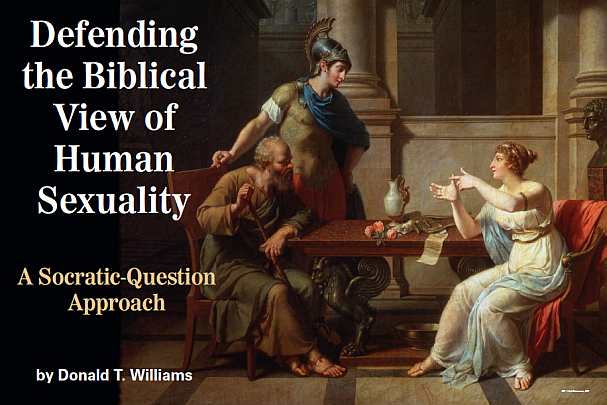This article first appeared in the Christian Research Journal, volume 40, number 04 (2017). The full text of this article in PDF format can be obtained by clicking here. For further information or to subscribe to the Christian Research Journal go to: http://www.equip.org/christian-research-journal/
One of the frustrations encountered by Christians trying to maintain a consistent witness today is that many of our contemporaries are so hostile to any presentation of the biblical view of human sexuality (see objection 1) that they will probably not listen to a direct proclamation of it and will consider it offensive however gently and lovingly it is given. They will find it harder, however, to be offended by questions. It is difficult to be offended when you are given the compliment of being asked for your opinion!
Socrates was the ancient philosopher who was famous for teaching by asking questions. He gave his name to the “Socratic method,” but there was an even better practitioner of it who came later and blessed it by His example: the Lord Jesus Christ. How can we follow their example in our own situation?
Well–designed Socratic questions can help to defuse tense encounters and also give nonbelievers the opportunity to encounter a different view without rejecting it outright before they even hear it. Here are some useful questions related to the five most common objections to the biblical position on homosexuality. Simply asking them will not convince anyone, but they can be fruitful in opening up a dialogue that otherwise might be very difficult to get started.
OBJECTION 1: Any criticism of the LGBT lifestyle is homophobia and hate speech!
Question 1A: Do you really believe I think less of a person just for having a different set of temptations than I do?
This question raises a crucial point. We are not singling out homosexuals as worse sinners than anyone else. We put ourselves on the same level — just as desperately in need of God’s grace. They do not perceive this truth at all — because some of us don’t perceive it, either. We had better be sure that we do.
Question 1B: If I believed you were heading off a cliff and I said nothing to stop you, would that be loving — or hateful?
Just asking this question will not convince anyone that homosexuality is disordered, or probably even that critiques of it are not hateful. It is a first step toward that conversation. We are trying to get people to reevaluate the assumption that any critique of the homosexual lifestyle is hateful automatically and could not possibly be anything else. We are trying to get that conversation started.
Question 1C: Have you heard of the fallacy of Poisoning the Well? Is it possible you are unintentionally committing it?
Poisoning the Well is preemptively setting a statement up for failure before anyone even has the chance to make it. “Have you stopped beating your wife yet?” If you answer yes, you admit you have been beating her. If you answer no, you admit you still are. No answer is possible that doesn’t sound bad. “Only an idiot would oppose this bill!” You are listed as an idiot for opposing it before you ever even open your mouth. My favorite example is from Chaucer’s “The Pardoner’s Tale.” The Pardoner is a medieval con man selling relics and indulgences. He claims miraculous powers for his relics but then warns, “If anyone has committed some sin so horrible that he has never confessed it, these relics will have no power in that case.” If you come back the next day complaining that the relic didn’t work, what will everyone assume?
We have to be careful with this question. It is too easy to bring up logical fallacies in a gotcha! spirit. That will backfire in a heartbeat. Nevertheless, Objection 1 does commit this fallacy by its very nature, and, at some point, that realization needs to occur.
OBJECTION 2: Why don’t you abstain from shellfish and from wearing mixed fabrics? You have no credibility unless you obey all of Scripture!
Question 2A: Have you ever heard of progressive revelation? Do you think God could have revealed everything we needed to know about Him all at once?
In all probability, your conversation partner has not heard of progressive revelation. The second part of this question will help him or her see the relevance of the concept. Most people have never thought of revelation as a historical process. They think of the Bible the way some of us unfortunately treat it — as a kind of encyclopedia of religious pronouncements rather than as a story with beginning, middle, and end, a plot with an arc taking us somewhere (from creation to the fall to redemption and restoration). It is important then that this question lead to the next one.
Question 2B: If not, is it possible that some practices might have been appropriate for an earlier stage of that revelation but be made obsolete by later stages?
It will be hard to deny that this is at least a reasonable theoretical possibility. It is one the person using this objection probably never has considered. And it leads to the next question, which is the bottom line.
Question 2C: Do you think it is possible that the Bible might actually tell us which practices must still be observed and which do not? Where might it do that?
If we are going to go down this road, we had better know where it does that ourselves. Relevant passages include the following: Acts 10:9–15 (Peter receives his vision of the sheets, in which God declares all foods clean1); Galatians 2:14–18 (Paul rebukes Peter for trying to impose Jewish customs on Gentiles); Colossians 2:16–17 (Paul says, “Let no one act as your judge” with respect to the feast days of the Ceremonial Law); 1 Timothy 4:1–4 (everything created by God is good and to be received with thanksgiving); Hebrews 10:1–18 (the Old Testament sacrificial system is rendered moot because it has been fulfilled in Christ).
The Old Testament Law had two parts, as we see in hindsight: the Ceremonial Law (intended for the Old Testament saints in the context of salvation history in which they found themselves) and the Moral Law (universal and eternal moral principles based on God’s character). The Ceremonial Law has fulfilled its purpose with the crucifixion of Christ and needs no longer to be followed; the Moral Law (including sexual morality) is always valid and hence still in effect. We realize that this distinction obtains because of the way different Old Testament laws are treated in the New Testament, and because of the rationale it gives for this difference in treatment.
The bottom line is that The New Testament overturns the dietary and other ceremonial provisions. That is why Christians are free to eat shrimp, cheeseburgers, and pork. They are not in fact being inconsistent or arbitrary at all when they do so but rather understand the Old Testament in the light of the whole of Scripture, unlike their critics. But The New Testament not only does not overturn Old Testament teaching on homosexual practice but also confirms it (see objection 3).
OBJECTION 3: The New Testament does not condemn faithful homosexual relationships, only promiscuous ones or male cult prostitution.
Question 3A: Where exactly is this distinction made in the New Testament? Is it in Romans 1:26–27? Is it in 1 Corinthians 6:9–11? Could you show it to me there, please — in the actual wording of the text, not in assumptions imported into it?
Romans 1:26–27 is part of a list of sins that continues in verses 29–31. They are not ceremonies attendant on the idolatry of verse 23 but rather disordered lusts (v. 24) that result from idolatrously rejecting the truth about God. Cult prostitution is therefore a red herring (i.e., an irrelevant sidetrack). First Corinthians 6:9 is part of a similar list, examples of the unrighteousness that is inconsistent with the Kingdom of God. In both cases, homosexual activity is seen as sinful per se, not just in certain special cases. It is not, moreover, treated differently from the other sins in the lists.
Question 3B: Is it possible then that you might be reading that distinction into these passages rather than out of them?
It is very possible! As with the fallacy of poisoning the well, it is also once again important here not to pounce triumphantly on your friends. (Note the way this question is phrased: “Is it possible that you might be…?”) If your friends do not come to this conclusion on their own, it will not help them become open to reconsidering the biblical view.
OBJECTION 4: Jesus says nothing about homosexuality.
Question 4A: Did Jesus say anything about marriage?
The answer, of course, is yes, He did. And all those statements presuppose traditional marriage between a man and a woman, as ordained by God in Genesis.
Question 4B: Was Jesus at all shy or timid about opposing Jewish interpretations of the Old Testament with which He did not agree? If not, then if He does not address something, what does that silence actually imply?
The truth is that Jesus was so forthright and bold in His opposition to contemporary religious concepts with which He disagreed that it led to His arrest and execution as a dangerous heretic. If He had disagreed with his contemporaries’ interpretation of the prohibition of homosexual practice in the Old Testament, He very probably would have said so. An argument from silence (argumentum ex silentio) never can be conclusive. Jesus’ silence on homosexuality therefore cannot be used to signal approval of it; if it means anything at all, the fact that He did not speak to the issue must logically be held to support the Old Testament teaching, not to overturn it.
Question 4C: Did Jesus authorize the apostles to speak for Him? Do they have anything to say on the subject?
Yes, He did. And yes, they did. See the questions and commentaries related to Objection 3.
OBJECTION 5: It is unfair to condemn people for an orientation they did not choose and cannot help.
Question 5A: I did not choose to be greedy, and I cannot help wanting things. Does that make it OK for me to take them? Should kleptomaniacs be allowed to steal because they believe they can’t help it?
Question 5B: Since I did not choose as a heterosexual to be attracted to more women than I am actually allowed to have, does that make it OK for me to have them?
The question of whether or not homosexual orientation is genetic and unchosen is worth pursuing, but not here. You will only end up tossing contradictory studies and data at each other, and it will be nearly impossible to reach a conclusion. The more important point to make — and an easier one — is that even if the orientation is not a choice, the conclusion gay advocates wish to draw from that alleged fact does not follow from it. The rightness or wrongness of an act, and thus the need to act on or resist the impulse to that act, have nothing whatever to do with whether or not we “chose” to have that impulse. We see that in almost every other context. Homosexual desires are no different. They simply cannot be justified by this argument.
Increasingly, these questions and their answers will be needed in dealing not only with secular people but also with confused Christians. To be effective with either group, they must be asked out of a genuine desire for dialogue. So think beforehand about how you might want to guide the discussion that ensues, fortify yourself with prayer and study, own these questions as your own, and then start asking them!
Donald T. Williams, PhD, is R. A. Forrest Scholar at Toccoa Falls College and past president of the International Society of Christian Apologetics. He is the author of ten books, including Deeper Magic: The Theology behind the Writings of C. S. Lewis (Square Halo Books, 2016).
NOTES
- Note that the primary purpose of this passage is to teach the Jews that believing Gentiles must now be accepted as full members of the Body of Christ without having first to convert to Judaism. A change in the status of the Jewish ceremonial law, including the laws about what foods are considered “clean,” is implied in, and entailed by, that change, as indicated by the analogy used. Otherwise, Gentile believers could never be accepted fully and integrated into the Body.









